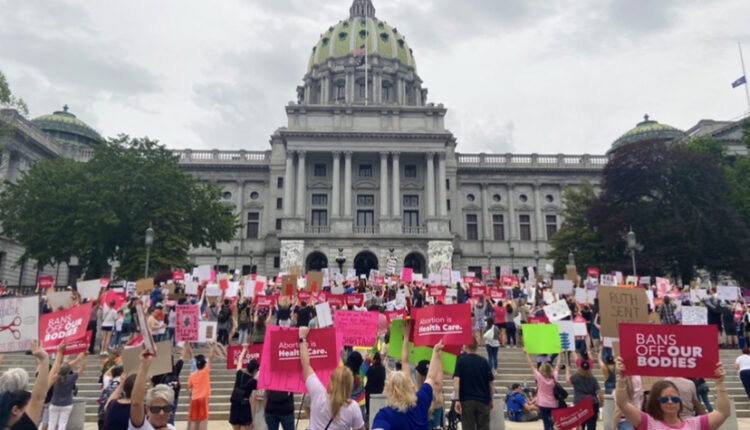White supremacy and the post-Roe pregnancy-to-prison pipeline | Opinion
By Kayla Frawley
This month our nation prepares for the Supreme Court announcement of overturning Roe v. Wade. As we turn the clock back to 1973, we must acknowledge that our complacency in white supremacy got us here half a century later.
Roe v. Wade is the landmark U.S. Supreme Court decision made in 1973, which ruled the Constitution protects a pregnant woman’s liberty to choose to have an abortion. After a leak on May 2, we learned that the majority conservative Supreme Court voted to strike down Roe v. Wade and “return the issues of abortion to the people’s elected representatives” — meaning state lawmakers would soon determine who gets access abortion and when.
It is shocking to know a policy choice is being made that will perpetuate preventable deaths of thousands of people across the nation, particularly Black women in the South and low-income women in more than half the states in the country that are expected to ban abortion completely.
Dangerous anti-abortion rhetoric prioritizes the rights of a fetus in order to punitively control the birthing body. Punitive sanctions enforced onto pregnant bodies always give us the worst birth outcomes. We have already seen what “post-Roe” scenarios can look like in states that have passed laws restricting abortions. A chilling example is the recent conviction Brittney Poolaw, an Indigenous teen, who suffered a miscarriage and faced an allegation that drug use contributed to it. She was arrested for first degree manslaughter and jailed for a year and a half while awaiting trial, not able to afford bail. This means she spent four years in prison all because of an allegation and the inability to pay a $20,000 cash bail.
Criminalizing pregnancy outcomes is a complete misuse not only of power but also public funds.
The American Bar Association reports that approximately 1,200 women have been arrested for pregnancy outcomes post-Roe. A country that has arguably the worst birth outcomes in the developed world — which would lead to additional criminal prosecutions for those poor birth outcomes — is punitively holding an individual responsible for systemic infrastructural failure.
These arrests will undoubtedly reflect the already existing bias in the criminal and legal system against Black and working-class women. Along with experiencing miscarriages and stillbirths at significantly higher rates than their white or Hispanic counterparts, Black women are also more likely to then be surveilled, criminally targeted and prosecuted. One could say the post-Roe world is a war on Black and low-income women, with a particular newly-designed pipeline to prison.
Hundreds attend ‘Bans Off Our Bodies’ rally in Harrisburg
Criminalizing pregnancy outcomes is a complete misuse not only of power but also public funds. It contributes to mass incarcerations, which leads to collateral consequences — like a lifetime of earning loss, lack of access to public benefits, lost jobs, traumatized children, compromised housing, etc.
Again and again we see this common playbook from “pro-life” and conservative radicalists that inspires state interventions to control and monitor the birthing body.
The founding mothers of the Reproductive Justice movement warned us about this in 1994, when 12 of them convened in a Chicago hotel room, in response to the Clinton Administration’s health care reform proposal given at a conference. The health care reform plan deemphasized reproductive health care, including less emphasis on prenatal and postpartum care, fibroid screenings, or STI tests, etc.
White women were the majority of participants at the conference and did not highlight concerns with the proposal. These 12 women called themselves the Women of African Descent for Reproductive Justice, and they bought ads in the Washington Post that eventually featured 800 signatures calling for a health care reform package to include concerns of Black women.
This history reflects a current fracture we have in reproductive justice advocacy — in that, not enough of us have fully committed to the original anti-racist philosophy that addresses intersectional issues outside of access to abortion.
In her essay “The Color of Choice,” Loretta Ross says, “The pro-choice movement, largely directed by middle-class white women, is oblivious to the role of white supremacy in restricting reproductive options for all women, and as a result, often inadvertently colludes with it.”
Advocates, Democrats energized by possibility of U.S. Supreme Court overturning Roe v. Wade
Some prominent abortion rights groups fail to understand the intrinsic ways that other products of white supremacy are also a part of the fight for reproductive justice. Things like family separation, infant and maternal mortality, mass incarceration, police brutality, gun violence, and family surveillance are all products of white supremacy that have been worsening, specifically since 1973, in our country.
As Loretta says, “Politicians have consistently used population control policies to occupy and conquer this land, produce an enslaved workforce and enshrine inequities and preserve traditional power regulations.”
If the abortion rights and reproductive rights movement doesn’t collectively actualize the original, anti-racist, pro-Black philosophy of reproductive justice, we will continue to be faced with history repeating itself and inequities perpetuated. Women of color have been telling us for half a century. Let’s not wait another half century to listen.
Kayla Frawley (she/her/hers) is a single mom in Denver, Colo., a former midwife, and currently the abortion rights and reproductive justice director with ProgressNow. She wrote this piece for Colorado Newsline, a sibling site of the , where it first appeared.
Originally published at www.penncapital-star.com,by Capital-Star Guest Contributor



Comments are closed.